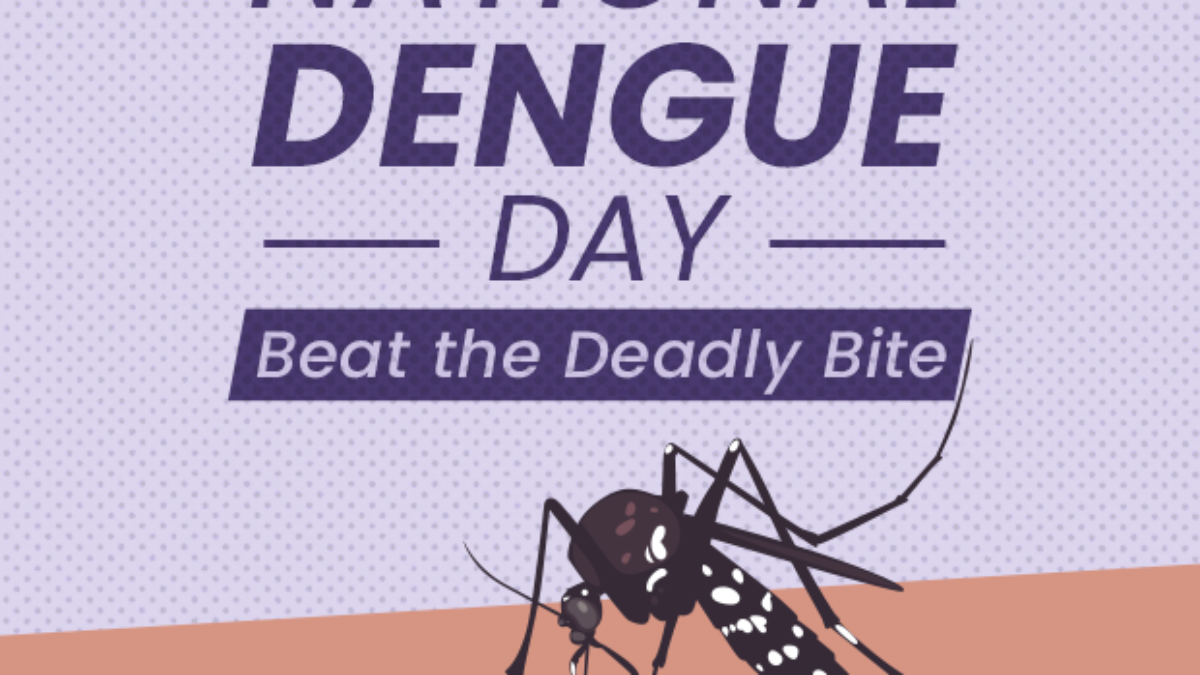National Dengue Awareness Day , It’s the time of the year when Dengue makes its headline on our national news. With cases increasing day by day, prevention and awareness of the necessary steps to avoid more cases become essential.
Some Dengue related facts
- Dengue is a common viral mosquito-borne disease that rapidly affects most people living in suburban and urban areas of India.
- Dengue is transmitted by the bite of the Aedes aegypti mosquito infected with any one of the four dengue viruses.
- Dengue is caused by the dengue virus (DENV, 1–4 serotypes)
- It is transmitted by mosquitoes spread in tropical and subtropical areas. Mostly, dengue mosquitoes bite human bodies in the daytime.
- When a dengue-infected mosquito bites a human, the virus circulates in the blood for 2-7 days when fever develops in the human body.
India experiences many fatalities due to various diseases and outbreaks of viruses, and dengue infection comes in the top 10 list. Every Indian must know how and where dengue mosquitoes are born. This is the best initial stage where one can quickly stop the massive outbreak of an infectious virus.
Know the hideouts of dengue mosquitoes ( National Dengue Awareness Day )
- Our houses could be an ideal place for the dengue mosquitoes to be born. They are usually born where the water-filled containers are rested for months without noticeable movement. The female mosquito then lays its eggs on the surface of water-filled containers, and eggs get hatched when submerged in the water. These eggs can live for months and be active. Female mosquitoes lay dozens of eggs up to five times in their lifetime.
- Clean water with sprinkled dust on the surface is an ideal environment for the female mosquito to give birth to other mosquitoes. Research has clarified that it can also be born in the muddy water, which has been stagnant for at least six days.
Warning signs of severe dengue:
Initial dengue symptoms can be continuous high fever, body pains, and nausea and vomiting. In addition, a dengue patient enters the critical dengue zone, where they might manifest sudden deterioration of symptoms.
One of the most common complications of dengue- Severe dengue hemorrhagic fever is a fatal complication and a medical emergency which requires immediate attention from an expert doctor.
There are multiple warning signs you should look for when it comes to severe dengue, and these warning signs can be seen within 24-48 hours after the fever has subsided.
- severe abdominal pain
- persistent vomiting
- rapid breathing
- bleeding gums or nose
- Fatigue
- Restlessness
- liver enlargement
- blood in vomit or stool
Prevalence of dengue in India:
According to global modeled data, 33 million dengue cases occur in India every year, contributing to one-third of the global dengue burden. According to the National Health Mission, the total amount of cases in 2021 in India was 193,245, and the deaths were 306. In 2020, the total number of reported cases was 44,585, of which 56 deaths occurred.
16th May, every year India recalls the importance of human lives by spreading awareness about dengue. And Ministry of Health and Family Welfare creates campaigns to generate awareness about dengue and ways to prevent the spread. It is an initiative that can only be successful when working in a team, and India and its people can be an excellent team in fighting dengue back.
National Dengue Awareness Day – Precautions to be taken to prevent the spread of dengue:
One of the best things to prevent any disease is to break its chain of causing the infection. Here, you can perform several steps and methods to prevent dengue.
The best method to control and prevent dengue virus transmission is to give a fair fight to mosquito vectors. Below-mentioned points are essential to keep in mind while fighting back.
1. Cover yourself with protective clothing:
It is highly advisable to sleep in a room with air-conditioning on and closed windows, as it will stop Dengue Mosquitoes from entering your room. Somehow, if they enter your room, use protective clothing to cover your exposed body parts, including the head, legs, ankles, and hands.
Use mosquito nets, a full-sleeve shirt/t-shirt, and long pants. And it is also advisable to wear light-colored clothes as they will not attract mosquitos to your body.
2. Remove smells from surrounding that attract mosquitos:
Mosquitoes are attracted to the smell of sweat and perfumes, and the best way to get rid of your sweat is to take a shower often a day.
3. Lit your home with an adequate amount of lighting:
Mosquitoes are habituated to breeding in dark places. And if the place where you are supposed to live is mainly covered with the dark, you are most likely to get affected by the mosquitoes and their painful bites that sometimes can infect you with dengue.
Use mosquito screens at the window and make them closed all day, leaving zero space to enter for mosquitoes. Make sure that your house has the sun stream all day.
4. Use mosquito repellent:
There are various mosquito repellent methods and ways available to use, and one of them is widely used is mosquito repellent creams; one should not apply these creams more than three times a day on their skin. Other mosquito repellent methods include mosquito repellent wipes, bands, and patches.
5. Eliminate breeding sites:
Mosquito breeding sites like open containers filled with water, stagnant water puddles, water coolers, etc., need immediate attention. Frequently changing the water from water coolers, emptying accumulated water in waste containers, vases, etc.
Author: Dr. Sujatha K-MBBS, MD, FID (Fellowship in Diabetology), M Med (Masters in Medicine-CMC Vellore), FFM (Fellowship in Family Medicine)
Visit our site : – Qurbook

